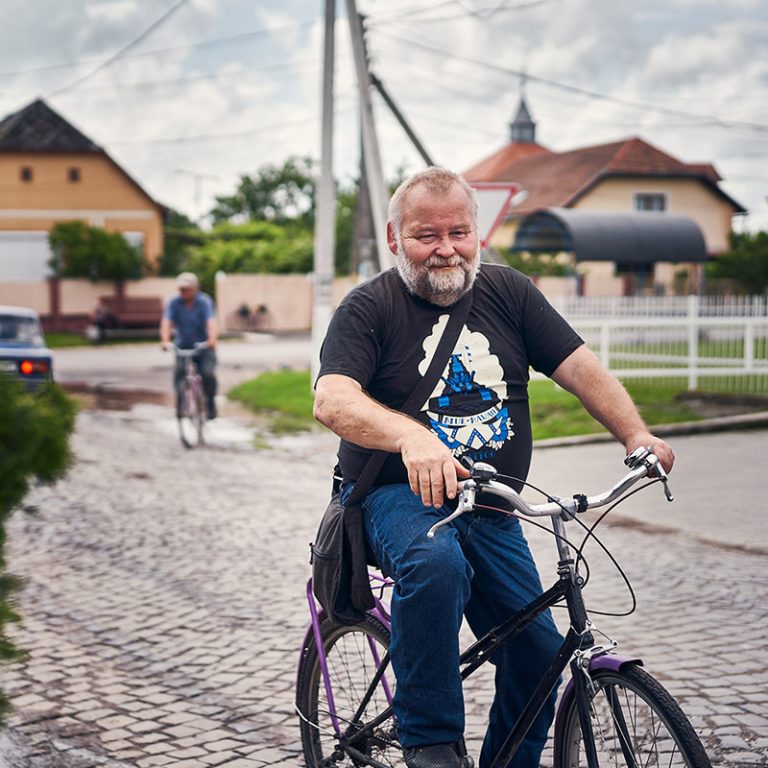Hungarians are one of the biggest minority groups in Ukraine. Their presence in the area dates back to the 10th century. Currently there are over 150 thousand Hungarians residing near the border in Zakarpattia. Despite that over the past 11 centuries the territory’s name and government changed dozens of times, this didn’t prevent local Hungarians from forming a very unique identity, tied together by the land, language, and culture.
Berehove is one of the towns in Zakarpattia where the Hungarian identity and historical heritage still maintains a very strong presence in everyday life. Founded in 1063 as an estate of the Hungarian Prince Lampert, over time the town grew and developed into a significant educational and cultural centre. Today Berehove has a Hungarian college, numerous Hungarian gymnasiums and schools, libraries, a museum, a house of culture, a children’s art school, and the only Hungarian theatre in Ukraine. Here in Berehove, a culture combining Ukrainian and Hungarian has evolved: the signage is written in both languages, people live by both time zones (Eastern European Time and Central European) and celebrate both Ukrainian and Hungarian holidays. It’s almost 300 km from here to Budapest, while 800 km to Kyiv.

The Hungarian theatre in Zakarpattia
Up until the early 1990s, there was no professional Hungarian theatre in Zakarpattia.
In 1993, the Diula Iyesha Hungarian National Theatre was founded in Berehove (we use the standard spelling here, although the locals say “in Berehovo”, a difference they rather adamantly defend — ed.). The theatre has become well-known today far beyond the borders of Ukraine. In response to this new demand for a Ukrainain-Hungarian theatre troupe, the Kyiv National Ivan Karpenko-Karyi Theatre, Cinema and Television University launched a specialised Hungarian course for actors recruited solely from Zakarpattia. Attila Vidnianskyi, a young graduate of that university and a native of a small village near Berehove, was invited to run the theatre. At first, he was hired as a director, and after one year he became the chief artistic director, a role he maintains to this day. Later, Vidnianskyi also headed the Budapest National Theatre, the country’s first theatre, to which he invited some actors from Berehove to join.
The first years were the most difficult. There was a critical lack of funding; for a long time actors worked for pennies, if they received their salaries at all. The difficult 1990s left only 5 desperate people in the troupe, who with only their enthusiasm and devotion continued developing the business over those first five years. The troupe was again able to grow after graduates of the second specialised Hungarian course at the Karpenko-Karyi University joined the troupe in 1998.

Oleh and Ibolia
One of the ethnic Hungarian actresses of the theatre, Ibolia Oros, was born and raised in Uzhhorod. Everyone in her family are ethnic Hungarians.
Ibolia was one of those who were accepted into the Hungarian theatre programme in Kyiv after her audition in Berehove. After two weeks of examinations alongside other students, she began studying in the capital. Initially, there were 20 students in the course, but by graduation only 12 remained. Almost all of them moved to Berehove afterwards to become the basis of the theatre’s current troupe.
Ibolia studied at a Hungarian school where Russian was taught as the only official state language of the USSR and English was taught as the foreign language. This meant that as she grew up in Zakarpattia, the Ukrainian Ibolia heard was, and still is, a mix of various languages and dialects.
The first time Ibolia heard literary Ukrainian, so different from the Ukrainian she had heard on the streets of her native Zakarpattia, was on a theatre stage in Kyiv:
— Oh my God, I thought — is this the Ukrainian language? It’s so beautiful!

Theatre director and actor Oleh Melnychuk is from Chernivtsi. His father is Romanian and his mother is Russian. Under the Soviet Union, he was not allowed to register his nationality as Ukrainian in his official identification papers and was told he could only choose between his parent’s nationalities. Oleh registered as a Russian since he knew very little Romanian. According to formal documents, he only became Ukrainian after Ukraine became an independent country.
— My parents and I speak only Ukrainian. My mom is from Tomsk, but she speaks the local dialect perfectly. I remember how earlier the only language you could hear at home was Ukrainian. Though sometimes my parents switched to Romanian when they didn’t want me to understand what they were talking about.
Ibolia and Oleh met in Kyiv in 1998 when they became neighbours in their theatre dormitory. At the time Oleh had just started working at the Lesia Ukrainka Russian Drama Theatre after graduating and working for a year at the Chernivtsi Theatre.
In Kyiv, Oleh became interested in the Berehove Hungarian theatre:
— I worked at the Lesia Ukrainka Theatre when Attila (Vidnianskyi — ed.) staged a play there. I saw one (of Berehove theatre’s plays — ed.), then another, I said to myself: “This is the best theatre I’ve ever seen.”
Oleh didn’t decide to move to Zakarpattia immediately, though. He and Ibolia remained in a long distance relationship for two years, seeing each other once a month or even every several months. In the end, Oleh chose Berehove and started working as an assistant director at the theatre. Moving to a new environment was not a surprise:
— I was born and raised in a similar multiethniс region (in Bukovyna — ed.). There was a long balcony all around our house in Chernivtsi, and the doors of apartments faced this balcony, that is, we all “coexisted” there. This was my childhood: two or three of us spoke Yiddish, two more — Romanian, we spoke Ukrainian, there — they spoke Russian. And it was normal when you went to a shop for people to talk to you in three languages. So when I came here — well, it was yet another language that was absolutely incomprehensible, and there was nothing for me to cling to. I had to learn it from scratch.
Between themselves the married couple at first spoke only Russian. They began actively speaking Hungarian and Ukrainian at home thanks to their children. They say that they didn’t want to deprive them of the opportunity to know the native languages of both parents. So Ibolia speaks Hungarian to the children, and Oleh speaks Ukrainian; and they still sometimes communicate with each other in Russian. The children easily switch between the two languages. They understand Russian rather badly, though. At some point the parents decided to “dilute” their family’s Hungarian speaking environment and decided to enroll their children at a Ukrainian kindergarten:
— They understood Ukrainian very well, but at first, they replied in Hungarian. So then we sent them to a Ukrainian kindergarten — there were, like anywhere else, lots of different children: Russians, Ukrainians, and Hungarians.

Ibolia considers the diversity of languages, cultures, origins, and worldviews as a basic feature of the local life. It’s normal for people to watch the news in Ukrainian and Hungarian and see two points of view — on this and that side of the border. As a result, they have a broader perspective on various issues:
— I have never felt that I wasn’t Hungarian in Ukraine. Here I have Russian-, Ukrainian- and Hungarian-speaking friends. For me, it’s been a fact of life since childhood. I’ve never felt disadvantaged because of it. On the contrary, I get more from it, because it opens up different cultures and various histories. I still really like it here.
The Berehove Hungarian Theatre is well-known in Europe and the world due to its frequent participation in theatre festivals, such as Kontakt in the city of Toruń (Poland) — one of the main theatre festivals in the world. They frequently tour throughout all of Hungary.
Ibolia and Oleh note that Attila Vidnianskyi successfully incorporates the cultural diversity characteristic of Zakarpattia, and embodies it in their approach to theatre and in their performances:
— When we were studying in Budapest they called us Ukrainians, not Hungarians. We were Magyars in Kyiv and Ukrainians in Budapest. When we go to Hungary they embrace us as their own people, because we speak the same language. They loved us so much, and now regularly invite us, but we are nevertheless from a slightly different culture.

Apart from the theatre, houses of culture are also being proactively restored in villages across the region. It’s noteworthy that these reconstructions and restorations are often funded by the Hungarian government:
— Hungary tries to encourage people to stay here, not to leave Ukraine, but to stay here and work. Certain grants are provided. I can’t say whether Ukraine does anything to prevent this.
Similarly, in 1996 with the support of Hungary, Ferenc II Rákóczi Zakarpattia Hungarian College, an influential and important educational centre — was opened in Berehove. Every year, hundreds of students graduate from the college. The college also houses several research centres. Their programs primarily focus on questions concerning the usage of Hungarian language in the region, the local history, and the study of interethnic relations. There are several exhibition halls where artists are both seasonally and permanently displayed. The library houses over 50 thousand copies of both academic literature and fiction.
Without the proactive initiative of locals, very little would ever get done. And in the 2000s, the Berehove Hungarian Theatre launched the Stalker Theatre Festival in Zakarpattia. The aim of the Stalker Festival was to unify the Ukrainian theatrical world and provide a platform for interaction. So far they have managed to hold three such festivals. The DAKH theatre took part in one of them. Their director Vladyslav Troitskyi staged another play here, which premiered in Hungary in cooperation with the Hungarian theatre. However, organising an event of this scale often runs into the problem of insufficient funding:
— We need to support it all financially because it’s a proper festival. I don’t think it should require any accreditation fees and so on. The festival should at the very least provide the accommodation, meals, venue, technical equipment, and cover travel expenses. When we were able to cover the costs for the Franko Theatre, it provided them the opportunity to produce and perform an entirely new play, “Morituri te salutant” for the festival.
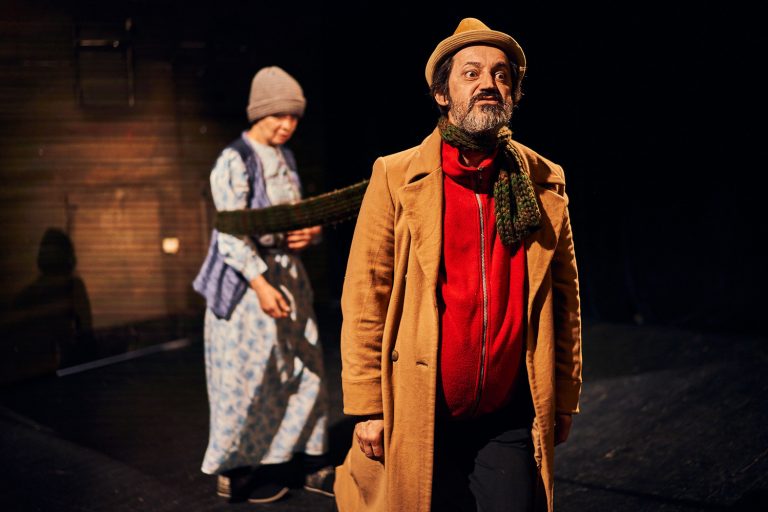
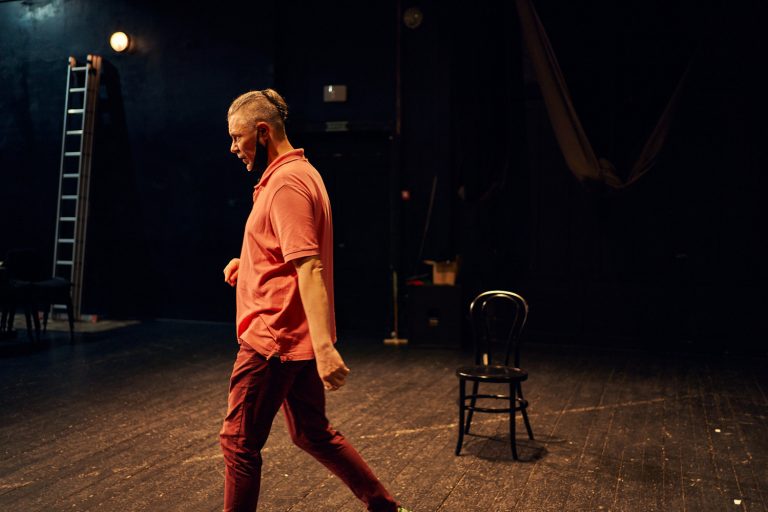
slideshow
The Berehove Hungarian Theatre has a very diverse audience. There are performances for children, so that “from early childhood kids can already develop a love for drama.” Most of the playgoers are young people who come to watch unconventional innovative plays, Oleh says.
— I often hear people speaking Ukrainian and Russian in the hall, but those who were born here or have lived here for a long time still more or less understand Hungarian. There are more young people, and for many it’s their first time going to a play. We also have fans who come to see the same production over a hundred times.
The theatre also organises transportation for residents of nearby villages, providing them a chance to see the plays. The local thermal springs attract many tourists year round from all over Ukraine. In consideration for tourists, the theatre has provided Ukrainian subtitles for performances for the past several years. However, Oleh notes that even before there were subtitles, many tourists still visited the theatre while on holiday.
Cultural diversity provides a wide range of topics and theatrical approaches for their productions. Oleh notes that each country has a different social and historical context and these do not always relate to those of another country. For example, war is relevant in Serbia because of the Yugoslav wars, and Serbian drama often centres around this theme. But in Romania, where they didn’t have a similar experience, the topic is rarely raised:
— As for purely political — we don’t have any such plays; it seems to me that this is not the “territory” of theatre. That’s my taste. Some love docudrama (documentary drama — ed.) — relevant, shocking. I personally don’t. This is mass media’s territory. The theatre shouldn’t get into this stuff and compete with the media — it will lose. We work within a different territory.
Many citizens often move abroad because of their proximity to the border and affinity for languages. Hungary provides a simplified procedure for obtaining documents, higher salaries, pensions, and better social welfare. Many young adults have had goals to study in Hungary since childhood, so they paid much less attention to learning Ukrainian. This trend can easily be observed at the local Ukrainian and Hungarian language courses: Hungarian is in much more demand.
— It is getting more and more difficult to keep those who are wavering between staying in Ukraine and moving abroad. Abandoning one’s roots, where one’s grandmothers and great-grandmothers lived, — that’s not so easy. Hungarians didn’t move here. They always lived here, they were born here. Only the borders have moved.
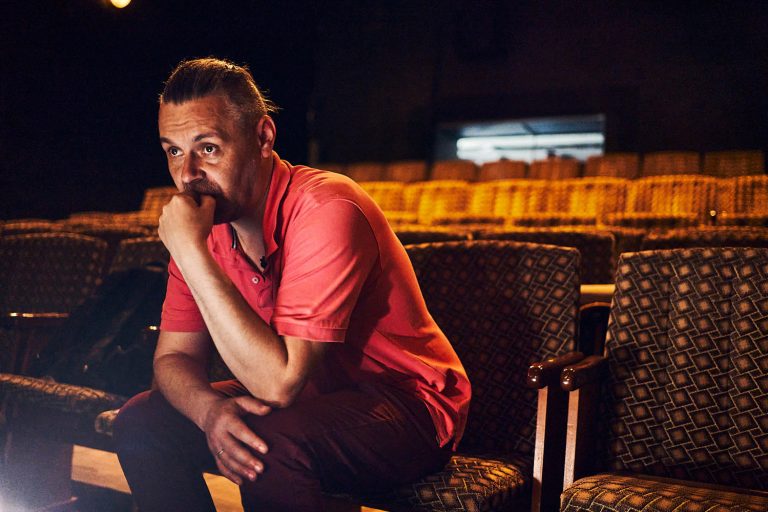
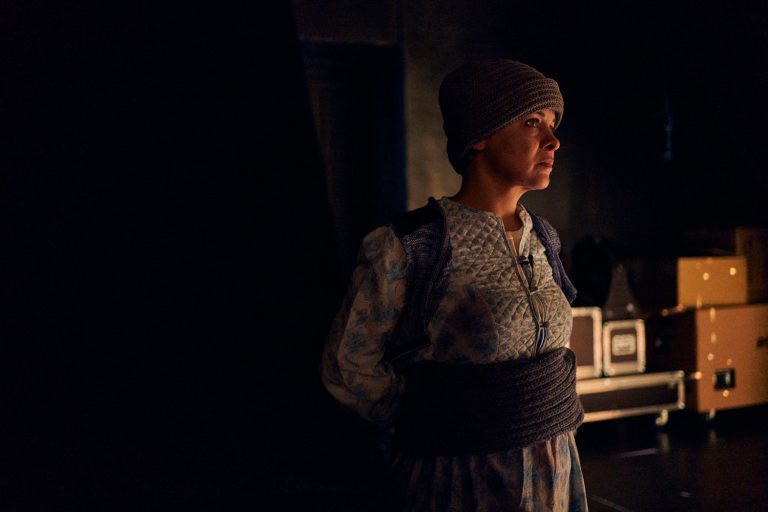
slideshow
Ibolia and Oleh can’t imagine themselves outside Ukraine. Ibolia notes the peculiarity of the local identity again — a place where Hungarians lived for centuries, developing differently from the national community that lived within their historical motherland:
— I am probably infected with this air. I studied in Budapest, and in Kyiv, but I wouldn’t like to live in either city permanently. Sure, I liked it that the more the world opens up, the more opportunities appear. It’s not in vain that we are Ukrainians there and Hungarians here. It’s a mix of cultures, and we became a little different. It’s easier for us to get on well, for example, with the Hungarians who live abroad, rather than with those who live in Hungary. They don’t understand us in many aspects, why we are who we are. And those who have experienced these same stories or worries, or tragedies abroad — more often we can deeply relate with them.
Oleh recalls how during a trip abroad he and some friends were sitting at the same table as a group of Germans. The guys started singing a Ukrainian lyrical song. The Germans got quiet and listened to us with delight:
— That’s when I thought: “We are Ukrainians!”. I also felt proud after the Maidan (the protest movement in Ukraine in 2013-2014 — tr.), I thought: “Are we really no longer “blind sheep”? Can people really self-organise and do something ourselves? And what happened was we said, “Authorities, stay sitting where you are; we know who needs help — the sick, the military, these people — we can do it ourselves!” This feeling of pride, of concern, and involvement — this is mine. When I am not in Ukraine for a long time, only then I can realise, well, feel, what Ukraine is. I don’t want abstractions. It’s not the anthem, or a vyshyvanka (the embroidered shirt — tr.). It just must affect you emotionally.
Ibolia adds to what her husband says:
— It’s good to come back home. Every time I come back from somewhere, no matter if I return to Uzhhorod or to Berehove, when I cross the border and am in Ukraine, every time I have a feeling that this is mine.

Andrii Kachur
Andrii Kachur, an ethnic Hungarian, is also a graduate of the specialised Hungarian course at the Karpenko-Karyi University. At first a stage manager for 16 years, four years ago he became a manager of the Berehove Theatre.
While in high school, Andrii took part in performances, and after graduation saw an announcement recruiting actors for Berehove Theatre’s course in Kyiv.
Andrii was born in a village near Berehove in a Hungarian family. Like Ibolia, he learned Russian well while in high school, and it was only later in Kyiv that he first heard literary Ukrainian; except for Andrii it was not from the stage but from a university teacher:
— We studied Ukrainian for half a year in Kyiv and I fell in love with a teacher from the very first moment. It was simply love. She loved what she had to teach us from the bottom of her heart and soul, and I somehow felt it immediately. I realised that Ukrainian is so wonderful on the ear. And I decided that I would either speak it like that or never speak it at all. But still, Ukrainian is not a native language for me. I try to speak it when I have the opportunity, but at home with my wife and children we of course speak Hungarian.
Andrii calls himself a Hungarian. He notes that he has never experienced ethnic or language-based hatred or conflict in Zakarpattia. Like most locals, he and his family celebrate Christmas first on the Hungarian calendar, and then on the Ukrainian:
— It’s almost like a fact, like how two plus two equals four, that here in Zakarpattia we have two Christmas holidays. We have two or even three New Years and we celebrate Easter and Pentecost twice. It’s not a problem since everyone knows this. Hungarian families who have relatives or just friends who are Ukrainian or Russian invite them to their houses, and in a week or two Hungarians are invited to their house to celebrate the same holiday.
— I was born here. Gold is underfoot. Where else to go? Where would it be better? My friends are here next to me, I have a business here. Where would I go and why? Would it be easier? I don’t think so. And happiness is here, too. You don’t need to go looking for happiness, just take it by the hands and hold onto it. And that’s it.

The building that has housed the Berehove Hungarian Theatre since the 1990s is the former Oroszlán (from Hungarian means Lion’s Yard) Hotel, the first hotel in the city to be built around the 1740s. At different times the building’s function changed: at one point balls were held in the large hall, at another it was a gym, and for a time it was even a dairy.
At first, the whole theatre huddled together in a small hall, where the roof leaked, rats scampered around, and in winter the temperature never rose above 17 degrees Celsius:
— Those were difficult times, but now, after a few years, we remember it with a smile.
Gradually, they began touring farther and farther away, their productions became more complex, and they fully repaired and equipped the theatre. In 2003, the troupe was given the premise’s large hall as well. Andrii remembers how at first the actors and actresses did everything themselves: they cleaned the halls, re-painted everything, and hung up the curtains.
— Our audience continues to keep on growing year by year. In the past five or six years, we haven’t performed a single show here at home to a half full hall. Many of our playgoers have even already travelled to see different theatres in Ukraine and abroad, such as Slovakia, Hungary, Romania, and Russia. But they always come back to us. So we have something to be proud of.
As a manager of the theatre, Andrii’s priority is to further develop the theatre here at home:
— My main goal is for us to perform here, in Zakarpattia. When we’re invited (on tour — ed.) it’s good, of course, but still we have to perform at home. Theatre fans wait for us, always asking if we are preparing a new play.
The troupe primarily performs in Berehove, but also travels to towns where the Houses of Culture are still in good condition. But it does cause problems that more people can’t come to Berehove due to the inflexible and poor public transportation options.
— We had to play a 1.5-2-hour show sometime in October or early December, wearing only light layers, like a shirt in the hall of a House of Culture that was only eight degrees Celsius. It wasn’t a pity for us; but it was a pity for the audience who had to sit there. This is one of our missions: even if they can’t come here (to Berehove — ed.), we still have to come to them.

For Andrii, the theatre is an integral part of him, the essence and main purpose of his life:
— Theatre comes before anything else. All the rest can wait. Either it governs you, or you have nothing to do with art. Either you love art because it is something deep inside of your very essence, or you love art because you can show yourself off through art — but that’s a different thing.
Sometimes the theatre invites famous directors to collaborate on a production. One such director with whom they maintain good relations is Vladyslav Troitskyi along with the entire troupe of the DAKH theatre:
— We don’t invite actors since knowledge of Hungarian is necessary. And Hungarian-speaking actors are very rare in Ukraine. But as for the directors — it always somehow turns out that our old acquaintances, friends, and theatregoers either look for us, or we look for them, or they have free time, or maybe have some ideas. But they couldn’t come to visit us earlier. And now (after we invite them — ed.) say, “Oh, I have already been planning it, let’s do it.”

Beregszász. Hungarians in Ukraine
On the land that today is split between Ukraine and Hungary, Hungarian tribes began to settle in the 9th-10th centuries. Mixed with the Turkic tribes, they moved from the east, likely somewhere around the southern Urals and the territory of modern Bashkortostan, and gradually crossed the territory of present-day Ukraine from east to west. That is why today small groups of Hungarians also live in other regions of the country.
As neighbours of the Slavic tribes, the Hungarians raided, plundered, and even sold them as slaves to the South (to the Ottoman Empire — tr.). They carried out similar raids throughout the West in Spain, Italy, the Frankish kingdom and others. Such practices were commonly adopted by most medieval states and proto-states as they regularly shifted borders every few decades depending on the success of the periodic campaigns.

In the 10th century, the Hungarian kingdom started to form. While the new state created a central power apparatus that adopted Christianity and a feudalist system, the state’s reliance on expansionist campaigns remained the same. They lost territories and seized new ones; actively uniting by marriage members of their own dynasty with neighbouring princes, princesses and important people (especially if the dowry included valuable territory). By the 13th century, the kingdom had expanded, occupying the territories of modern Slovakia, Transylvania, Croatia, and Zakarpattia.

In the 11th century (1063), where Berehove is currently located, the town of Lampertháza (a territory of current Zakarpattia — ed.) first appeared. More accurately, Lampertháza was an estate that belonged to the Hungarian Prince Lampert, the son of King Béla I. A bit later, after the Mongols razed through a significant portion of Europe in the 13th century, the town was renamed as Lampertszász. According to the available historical documents, Lampertszász emerged as a town in the traditional sense of the word only in 1247 (or the estate grew enough to become one). During that period both the town and the region were under the rule of Hungary. A century later the town received its Magdeburg rights, after which handicrafts and commerce actively developed here.
Finally, in 1499, the name Beregszász first appeared, which would later turn into Berehove.

In the 16th and 17th centuries, the Ottoman Empire and the Habsburg dynasty “exchanged” territories here. Right at that time, a little to the east, Bohdan Khmelnytskyi established his own (Cossack — ed.) state, periodically either negotiating or fighting with its neighbours. Berehove suffered destruction by invading forces three times. First, in 1566 when it was destroyed by the Tatars. Second, in 1657 when it was burnt by Polish troops led by prince Lubomirski (in revenge against the local prince György II Rákóczi, an ally of Bohdan Khmelnytskyi’s). And third, in 1686 when it was again burned to the ground, this time either by the Habsburg army, or by the troops of Ilona Zrínyi retaliating against the Austrian troops’ assault, or by Hungarian rebels led by Imre Tekeli.
Finally, in 1698-1699, almost all of Hungary, including Berehove, all at once came under Austrian rule. While it seemed that Berehove had more or less accepted the Austrian conquest, in 1703-1711 the city took part in the uprising against the Habsburgs led by Ferenc II Rákóczi, the man who the town’s pedagogical college is named after.
Berehove continued developing as a trading and crafts centre. In the 17th century, the first hotel was built here — Oroszlán — which a few hundred years later would become an art centre and house the Berehove Hungarian Theatre. The two-storey Baroque building was built of brick and stone and covered in tiling. Over time, people added several memorial plaques dedicated to famous Hungarians (such as Sándor Petőfi and Ferenc Kazinczy) who once tasted drinks on the ground floor’s tavern while on the second floor they made history with their prolific and varied artistic output.

The main event of the 19th century (and not only for Taras Shevchenko) was the abolition of serfdom. At that time, Berehove together with all of Zakarpattia, became a part of the Austro-Hungarian Empire. Trade was actively developed, fairs were held, and various enterprises and workshops were opened.
However, by the early 20th century, Zakarpattia was one of the poorest regions of the empire. Literacy levels in the region were very low and the central authority was not interested in economically developing the region at all. Moreover, a Magyarisation policy was forcibly implemented in the region: the Orthodox Church was forbidden and there was no Ukrainian language instruction in schools. Despite this, Ukrainian patriotic and revolutionary attitudes spread throughout the region, just like they did in other territories similarly divided amongst other states or empires. In some areas (within Zakarpattia — tr.), a movement of Rusyns developed that pushed for the region to join the Russian Empire. After World War I, people’s councils emerged, and the population split into several groups: one supported Hungary; the other wanted to join Czechoslovakia; and a third, represented then by the ZUNR (the Western Ukrainian National Republic — tr.) and the UNR (the Ukrainian National Republic — tr.), wanted to fight on behalf of Ukraine.
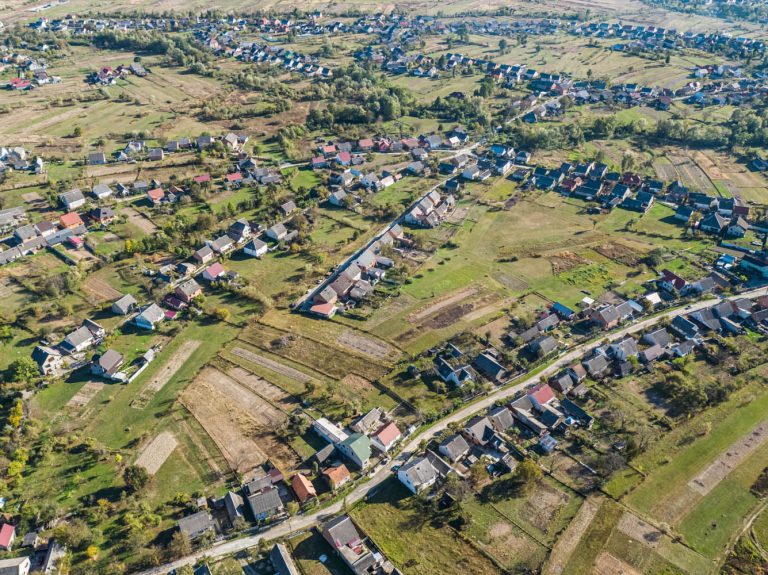
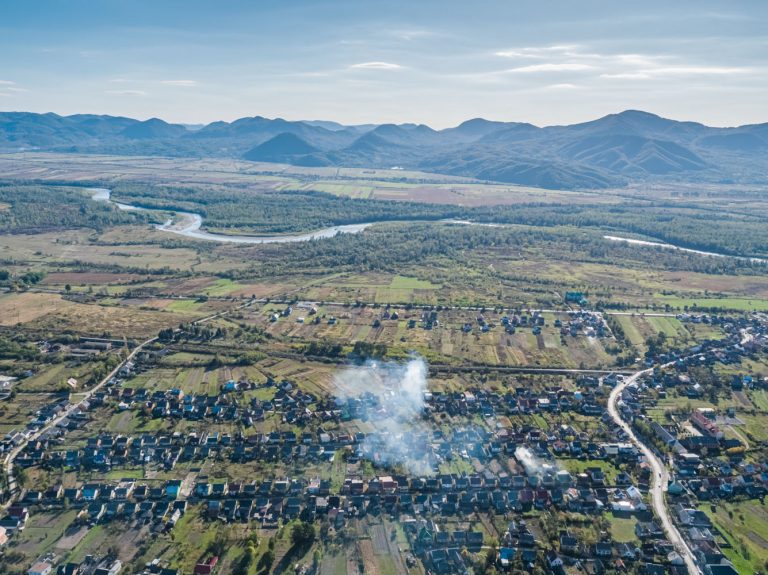
slideshow
In November 1918, in the midst of political and military vicissitudes on the territory of modern Ukraine, the Ukrainian (later Rus) People’s Council was created — a self-governing authority of a separate small state — for a new Hutsul Republic in the village of Yasinia in Zakarpattia. The Council strongly opposed the entry of Subcarpathian Rus (the name then used for the territories of Zakarpattia) into Hungary, and held negotiations with the ZUNR concerning joining the future Ukraine. The Prime Minister of the ZUNR, Sydir Holubovych, was happy with this initiative of a “distant relative from behind the mountains” and first supported the People’s Council informally and then openly. The ZUNR troops even managed to reinforce some of the villages for a while. But in 1919, as a result of international agreements, part of this territory was put under Romanian military control. Under the terms of the September 10, 1919 Saint-Germain Peace Treaty, this territory became a part of Czechoslovakia and remained so until World War II.
However, for a brief period Carpathian Ukraine (the name that replaced Subcarpathian Rus in 1938) became an autonomous unit. First as a republic within Czechoslovakia, and then as an independent Ukrainian state with its own constitution and symbols. It was headed by Avhustyn Voloshyn. But the newly formed state lasted only one day. On March 15, 1939 it was occupied by Hungarian troops again. After World War II, the lands of Zakarpattia finally joined the Ukrainian SSR, and later became a part of independent Ukraine.

Beilo Leshko. Hungarians in the ATO*
Beilo Leshko lives in Velyka Byihan village near Berehove. A former musician in the military orchestra and a volunteer in the ATO (Anti-Terrorist Operation in Eastern Ukraine), currently he works developing his own farmstead and repairing his farm’s outdoor facilities. His older son studies English Linguistics in Great Britain while his younger son studies and lives as a programmer in Budapest with his mother, who works there.
Beilo calls himself a Hungarian, although he has Slavic roots: his great-grandfathers were Hutsuls. His wife is an ethnic Hungarian. They speak Hungarian within the family.
Since childhood Beilo has played wind instruments well. At that time, in his native village lived a graduate of the Austrian Conservatory who adopted a rather academic approach when teaching the locals in their amateur orchestra. Joining up with a guitar player, Beilo formed a trumpet-guitar ensemble and began performing in nearby villages and towns. At one point a military conductor heard Beilo playing and invited Beilo to play in the military orchestra. As he says, all his life has in some way or another been connected to the army.
When the war broke out in Eastern Ukraine, Beilo went to a military enlistment office to join himself up:
— I was working in Hungary at the time. And when I found out what was going on here, in Ukraine, I said, “that’s it, I need to go home”. It was the second wave of mobilisation. I’m an ethnic Hungarian, I live in Ukraine, and I’m not allowed to distance myself from all of it. They said that this is not our war, that it doesn’t concern us. I said then, it concerns everyone. Everyone in general. That’s how I found myself there. And I didn’t regret it.
For seven months Beilo was a military cook stationed near Donetsk. He has many memories of the ATO. An experience that made a particularly strong impression on him was when an elderly local resident asked if she could have their leftover food, explaining that she wanted it for the dogs. But as it turned out, she and her sister had no money for food, and collected the leftovers to eat themselves. The military base gave the woman canned food and pasta, and she later came back to bring the soldiers home-grown greens and milk in return. There were a lot of such poignant stories while he served in the army, Beilo recalls:
— I remember it very well: it was New Year and children came from kindergartens to greet us. It was so wonderful and beautiful. At the same time, I saw there (in the East — ed.) enormous poverty. You’ve probably never seen anything like it before. People just starved, they lived as beggars. There were no jobs, the mines didn’t work.

According to the soldier, the locals in the Donbas were skeptical about Ukrainian soldiers, in particular because of Russian propaganda. But Beilo recalls how their commander, by trying to build a trusting relationship with them instead and finding ways to address local needs, was able to change their attitude and the situation:
— When it was time to return back home, on the one hand, there was even regret, since we had gotten used to being there. Because those people we met were very kind, very good. I still have their phone numbers in my mobile. On holidays, on New Years, we call and greet each other.
Out of the almost 200 soldiers in the battalion, there were 30-35 ethnic Hungarians, and only half of them knew Hungarian. Mostly they spoke Russian, and by the end even a little Ukrainian. In Beilo’s opinion, problems with interethnic hostility in Zakarpattia are mainly artificial:
— But there are common interests, aren’t there? Our children go to school together. Thank God. We work together. The hay needs to be mowed, potatoes need to be dug up — we go and help, they go and help. No problem.
When the Verkhovna Rada passed amendments to the Law on Education in 2017, the issue concerning which languages of instruction would be allowed remained unclear and provoked objections from Hungary and Hungarians in Zakarpattia. After receiving the advice of the Venice Commission, the finalised law provided for a gradual transition aimed to increase the percentage of time students spent being instructed in Ukrainian. More specifically, this meant that while 4th grade students would study in Hungarian, by the end of the 5th grade students should be learning in Ukrainian 20% of the time, and by the end of the 11th — 60% of the time. Schools maintain the individual right to choose which subject gets taught in which language, and the law does not apply to private schools at all. This is a sensitive issue for Hungarians. This isn’t about separatism or a desire to move to Hungary, it has to do with the fact that language is a part of their identity and they don’t want to lose it.
Beilo proposes a solution that focuses on changing the methodology of language instruction at schools. For most Hungarian children, Ukrainian is not their mother tongue; since childhood they have only spoken and heard Hungarian. For this reason, Ukrainian should be approached the same as a foreign language, he says. In Beilo’s opinion, this shift would significantly simplify how local people perceive and react to Ukrainian language instruction laws.
For Beilo, it’s quite normal that in his motherland Ukraine bells ring everyday at noon to honour the memory of Hungarians who died during the Tatar invasions centuries ago. He loves Ukrainian folk music and considers it to be very similar to Hungarian music. When life becomes difficult and he has to deal with complicated emotions, his escape is music, not the neighbouring country.
— Ukraine is you and me. This is the country where I live. I have to love it. It is my duty. I respect Ukraine as my country. In fact, it is a rich and abundant country. Just look —the wealth is everywhere here. I am a local patriot. Of course, I love Hungary as my historical motherland, but I love Zakarpattia, too, you know? Berehove is the most beautiful town to me. There is no better place. Every tree, every pillar knows me, every neighbour greets me here.
supported by
Material prepared with support of United States Agency for International Development (USAID)


